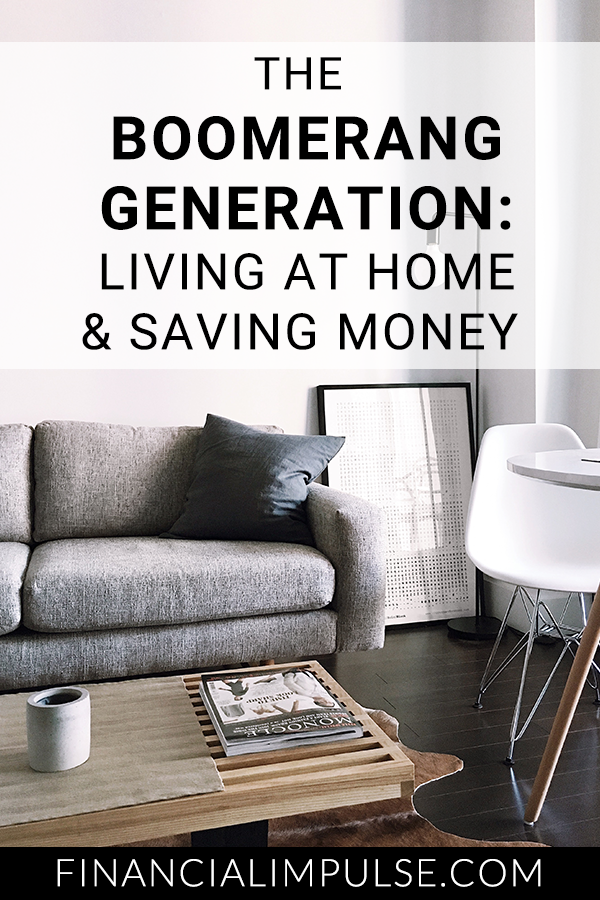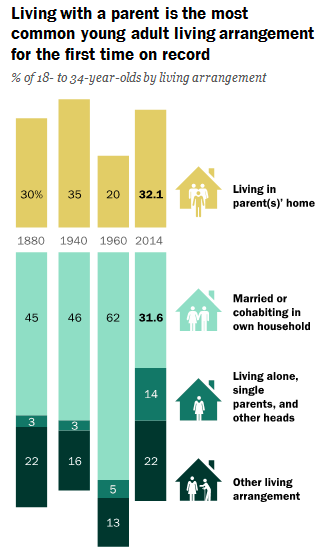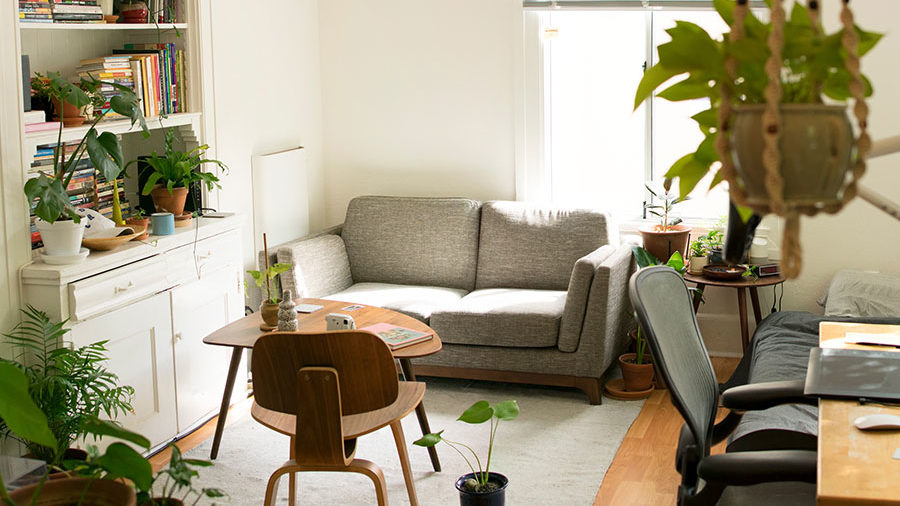Living at home comes with big financial benefits as well as stigma and stereotypes.

I’m part of what’s called the “boomerang generation.”
At 26, I moved back home to the suburb where I’d lived for most of my high school years.
The last time I lived there—at least, for longer than winter or summer break in college—was during high school. Since then, I’ve lived on-campus as an undergrad, in an apartment close to work, and overseas.
Living at home comes with its fair share of stereotypes and preconceptions, but in recent years, it’s become a more common phenomenon. Why?
I thought I’d look into the topic and also share my own reasons for moving back home.
The Boomerang Generation: Statistics
Like a boomerang returning to its thrower, the term “boomerang generation” refers to young adults, typically in their late twenties to early thirties, who move back home with their parents after living elsewhere, e.g., college.
While most pop culture observations about boomerang adults began in the early 21st century, evidence suggests this shift in living arrangement has been developing for a longer period of time.
Specifically, here’s what the research says about the number of young adults living at home in the U.S.:

- A record number of 21.6 million millennials, or 36% of the young adults in the U.S., lived at home in 2012. This percent was the highest share in over 40 years. (Pew Research Center, 2013)
- In 2014, young adults (between the ages of 18 and 34) were slightly more likely to be living in their parents’ home than living with a spouse or partner in their own household. This marked the first turn of living arrangements in over 130 years. (Pew Research Center, 2016)
- The number of multigenerational households in the U.S. has been increasing since 1980, with young adults the most likely to live in such households in recent years. (Pew Research Center, 2018)
- The overwhelming majority (81%) of young adults living at home either work or attend school. (U.S. Census Bureau, 2017)
- In spite of an improved job market in recent years, the number of millennials living with their families continues to rise. In 2007, 71% of young adults lived independently; in 2015, this share had decreased to 67%. (Pew Research Center, 2015)
- The reasoning behind moving back home may vary according to race. For young black adults, high rental costs deterred them from living independently; meanwhile, young white adults generally chose to live with their parents because of issues in employment. (Journal of Housing Economics, 2018)
Why live at home?
The demographic shift in young adult living arrangements is in large part due to economic reasons like the Great Recession, rising student loan debt and homeownership costs, and poor job opportunities.
However, it also coincides with changing trends in marriage, as more and more young adults of today’s era choose to get married later. For instance, 59% of 18- to 29-year-olds were married in 1960 compared to just 20% in 2010.
These social and economic trends lay out a broad context for why many young adults choose to boomerang home, though of course, they don’t necessarily paint a full picture. Here are my own reasons for moving back home.
Living at home reduces my expenses significantly.
While many boomerang adults cite financial issues like debt or unemployment as their reasoning for moving back home, this wasn’t why I chose to do so.
On the contrary, I paid off my student loans in 2016, prior to moving back home. I also work full-time and freelance on the side.
This puts me in a great position financially, as I live rent-free. (While I’ve offered to pay, my mom has graciously refused and insists instead that I focus on saving for homeownership in the future. In general, I try to give back by taking care of her bills and household chores.)
My monthly income varies depending on the number of freelance projects I take on, but on average, living at home helps me save an average of 50% of my earnings—a tremendous boon to my financial goals.
Family time means a lot to me.
Outside of its financial benefits, I was also intrinsically motivated to move back home, as I genuinely value spending time with my family.
My dad passed away while I was in college, and the experience of losing him was pivotal in changing some of my life views—including how much I value my family.
Moreover, as an unmarried young adult, I know the opportunity to spend such extensive quality time with my mom will only grow more limited in the coming years. While I generally spend weekends at my boyfriend’s place, being physically close to her the rest of the week means more quality time together.
My work situation enables me to live at home.
Prior to moving back home, I lived and worked overseas in Taipei. I wasn’t there very long in the grand scheme of things—but with a long-distance boyfriend, I was itching to get back home to the States.
At the time, I had a handful of coworkers who had also left Taiwan and were working remotely—but they had all been with the company significantly longer than me and/or had more senior roles. Fortunately, when I told my manager I was planning on returning to the U.S., he graciously allowed me full-time remote working privileges.
If my company hadn’t allowed me to continue working for them on a remote basis, I’m not sure that I would be living at home. This would’ve been dependent on the local job opportunities available and whether I succeeded in actually snagging one.
Cultural Perceptions of Adult Children Living at Home
I’m not at all ashamed or embarrassed to live at home, though admittedly, if this had been the case a few years earlier, I might have been.
But why?
There’s a cultural stigma in the West about adults living at home. You can see it most clearly in the 2016 rom-com Failure to Launch and stereotypes of deadbeat adult children hanging around their parents’ basement.
With the growing normalcy of boomerang adults, however, this cultural taboo is perhaps waning—although it nonetheless remains a point of intrigue and discussion. Just consider how many articles were written about actor Michael B. Jordan when he revealed he lived at home.
But while much of the U.S.’s mainstream culture perceives adults living at home as unusual, other cultures around the world view it differently.
Living at Home in the U.S. vs. Overseas
After spending two and a half years living in Taiwan, my own views of living at home have been reshaped. There, many of my local friends and coworkers still lived at home, even well into their thirties. While this is in part due to exorbitant housing costs, it’s also the cultural norm.
And it’s not just Taiwan. Around the world, in countries like Italy, South Korea, and Greece, it’s common for adult children to live with their parents.
Perhaps, for this reason, modern immigrant families in the U.S. are more likely to live in multi-generational households.
As a first-generation American, I can relate. To my Taiwanese mom and relatives of her generation, my living at home is of no issue to them. I’ve also observed a similar trend among friends and classmates that come from immigrant backgrounds—for some, living at home as an adult, even until marriage, is a natural expectation.
How Perceptions of Living at Home May Affect Mental Health
Is there any value to normalizing the trend of adults living at home?
Maybe unexpectedly so.
According to a study by the Max Planck Institute of Demographic Research, “boomeranging” back to a parent’s home is connected with a higher likelihood of depressive symptoms in young adults.
When delving further into these findings, it’s important to remember that correlation does not equal causation.
In other words, it’s inaccurate and unwise to claim that moving back home negatively impacts mental health, as there are many other variables at play. For instance, the presence of depressive symptoms could be a result of job loss, or any other setback that led someone to move back home in the first place.
However, that said, in a society that values independence like the U.S., the stigma attached to boomeranging home can certainly contribute to poor mental health outcomes. If someone feels judged negatively for living at home, their mental well-being may suffer adverse consequences.
Final Thoughts
Although Western society generally frowns upon adults living at home, there is a privilege in being able to do so. I’m aware that others with estranged family circumstances or those who do not have job opportunities close to home simply cannot do so.
In light of this, I don’t take my living situation for granted; I relish it as an opportunity to build my savings and spend time with family.
As for how long I plan to live at home, I’ll be honest: I don’t have a definitive timeline for moving out. However, I don’t anticipate staying for more than two years, although this is certainly subject to change, based on life and career developments. And that’s perfectly okay—in the meantime, I’ll enjoy the benefits of living at home, regardless of what society calls normal.
That said, let me be clear: I don’t believe living at home as a boomerang adult should be anyone’s end goal. However, I also believe it should not be looked down upon or discouraged as it conventionally is in the U.S. Regardless of your financial situation—whether that’s employed or not—a temporary move back home can provide a valuable financial boost.
Have you ever considered moving back home? Why or why not?






As an older, Boomer, reader I find it odd that in posts on living with the parent(s) it is discussed as a choice made by the grown child. It’s only a choice if your parent offers it, that’s not a given. For my three millennial kids it’s not a choice, unless it’s a serious emergency or a very short term convenience, they simply don’t have the option. We raised them to be independent adults, we love visits but no way we would tolerate them as longterm roommates. We earned the benefits of an empty nest!
Thanks for commenting, Steveark! That’s a great point that I think speaks to the differences in cultural perceptions of adult children living at home. You’re absolutely right that living at home is only an option as long as a parent allows it. However, in some households, particularly immigrant ones, it may very well be perceived not as a choice but rather, an expectation for adult children to live at home.
No referring to your specific situation but parents should want to get their kids out on their own. There are plenty of benefits to staying home, many of which you outlined so well in this article, but producing a self sufficient child should be at the top of every parents life goals.
Parents should want you to struggle a little bit. Figuring out life is the whole point to life. They should provide you with guidance and the toolset needed to overcome obstacles thrown their child’s way.
Thanks for stopping by, Dave! Agreed—parents should definitely aim to raise their children to be self-sufficient. I also agree that enduring challenges is important for personal growth. To be clear, the point of this article was not to suggest otherwise.
However, that said, I don’t think that means parents should avoid helping their children altogether. Of course, there should be limits on the extent of that help—but raising your children to be self-sufficient and providing assistance along the way are not mutually exclusive.